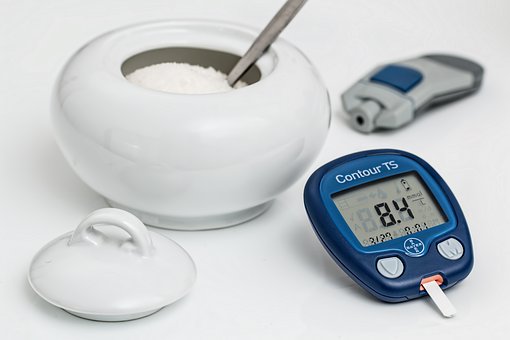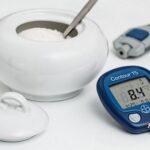What is high sugar?
Hyperglycaemia is the medical term for high levels of sugar in people with diabetes. It can be caused by several factors, including: illness, physical activity, dietary choices, non-diabetic medications, skipping insulin or glucose-lowering medications.
High blood sugar affects people with:
- Type 1 diabetes.
- Type 2 diabetes.
- Pregnant women with gestational diabetes.
- People who do not have diabetes, but have a serious illness (stroke or heart attack, severe infection).
Also read: What is the normal blood sugar level for diabetics and healthy people?
Symptoms of high sugar
Symptoms of hyperglycemia in people with diabetes develop slowly, over several days or several weeks. In some cases, no symptoms may appear until your blood sugar becomes dangerously high. The following are symptoms of high blood sugar:
1. Symptoms of cumulative high blood sugar
Cumulative glucose is the ratio of blood glucose bound to normal hemoglobin within the last two to three months. Symptoms of cumulative high blood sugar are as follows:
- Constant fatigue.
- Weight loss.
- extreme thirst
- urinating a lot
- Eat a lot.
- Lack of focus.
- Extreme lethargy.
- Blurred vision.
- irritability
- Difficulty healing wounds.
- frequent infections.
- Dental infections.
- skin infections
- Urinary tract infections.
You can read: the normal cumulative sugar table and the normal blood sugar level
2. Symptoms of high blood sugar in women
Symptoms of hyperglycemia in women vary depending on the time of diagnosis. These symptoms may include:
- thirst.
- frequent urination.
- blurred vision
- Unexplained weight loss.
- Excessive and persistent hunger.
- Yeast infection in the vaginal area.
- Nerve damage.
- shortness of breath.
- Low exercise tolerance.
Physical symptoms of high blood sugar
Hyperglycemia may not cause any physical symptoms until glucose levels are persistently above 10 mmol/L.
The higher the blood glucose levels, the more serious the symptoms. This is what makes many patients unaware of their infection due to the lack of obvious symptoms. Here are the main physical symptoms of high blood sugar:
1. Increased thirst and frequent urination
Frequent urination, especially during the night, is a sign that your kidneys are working overtime to get rid of urine
Excess sugar in the blood, while it is normal to urinate four to seven times a day.
In order to avoid getting up frequently at night to go to the bathroom, try not to drink after 7 pm, especially caffeinated beverages.
Frequent trips to the bathroom, even with limited water and caffeine intake in the evening, is a red flag that calls for a visit to the doctor.
2. Fatigue and weakness
Fatigue and weakness is a sign that your body is unable to use the food you eat for energy. How is that?
When you eat food you get glucose which is used for energy. This is done by being transported to the cells by insulin.
When insulin is deficient, glucose stays in the blood instead of moving into the cells and being used as energy. Which leads to high blood sugar, and thus feeling very tired and sleepy.
3. Blurred vision
Vision changes can be a warning sign of high blood sugar. Diabetes affects every part of your body, including your eyes, by changing the fluid levels in your eyes, causing swelling, blurred vision, or difficulty focusing on things.
So if you notice changes in your vision, you can consider visiting an ophthalmologist, but also include a visit to a diabetes doctor among your options.
4. Slow healing wounds and infections
High blood sugar disrupts circulation and blood flow, making it take longer for cuts, bruises and infections to heal.
Diabetes can also weaken your immune system, making you more susceptible to frequent infections, such as: vaginal infections, yeast infections, bladder infections, and skin infections.
High blood sugar makes it difficult for white blood cells to move through the bloodstream, which reduces the body’s ability to fight infection.
5. Tingling or numbness in the hands or feet
A red flag of high blood sugar is any tingling or numbness that tends to burn in the feet, especially when you wake up.
The reason for this is that excess blood sugar damages nerve endings, especially the nerves furthest from the spinal cord, such as the feet and hands.
6. Weight loss or gain
When blood sugar is too high, and the body does not produce insulin or is unable to use it properly, the cells do not get enough glucose to produce energy, and as a result the body begins to burn fat and muscle mass for energy, causing a sudden drop in weight.
Behavioral symptoms of hyperglycemia
Fluctuations in blood sugar levels lead to changes in mood. Among the factors affecting mood are the physical symptoms associated with high diabetes, such as: difficulty seeing and concentrating, malaise, fatigue and low energy. The following are the behavioral symptoms of high blood sugar:
1. Irritability and mood swings
Living with high blood sugar often affects mood and mental health. People with diabetes experience mood swings – stress, depression, anxiety – when their blood glucose levels are too high.
Diabetics sometimes feel exhausted, as a result of the necessity of managing the disease on a daily basis. The best way to avoid these fluctuations is to understand and follow a diabetes management plan in order to mitigate the spikes and dips in blood sugar that may cause mood swings.
2. Difficulty concentrating
When blood sugar levels are high, levels of the glucose transporter GluT1 drop, which reduces its uptake. Among the chronic effects of this condition are:
- Decreased energy production in the brain.
- brain fog
- increased oxidative stress.
- cognitive decline
- Difficulty concentrating.
3. Increased hunger and cravings
People with high blood sugar eat a lot of food before feeling full, and this increased hunger is called polyphagia.
This happens as excess glucose is excreted in the urine, and the calories contained in the glucose are excreted as well, leading to hunger. In order to quell hunger, you start eating more food to make up for those lost calories.
4. Lack of sleep and insomnia
There are several physical symptoms caused by high blood sugar, which can interfere with your sleep through the night, and cause you to sleep poorly and insomnia. Among them is excessive urination, which causes nighttime trips to the bathroom that may interfere with the quality of your sleep. High blood sugar may also lead to other symptoms that affect sleep:
- Headache.
- increased thirst
- Tired.
Long term effects of high blood sugar
If hyperglycemia is not treated, you can experience the long-term effects of hyperglycemia, which can be life-threatening, including:
1. Diabetic ketoacidosis (DKA)
Ketoacidosis is a condition more common in people with type 1 diabetes, which causes a buildup of ketones in the blood.
Ketoacidosis may be the first sign of diabetes, especially in those who have not yet been diagnosed. It can develop slowly with the following symptoms:
- Thirst and dry mouth.
- frequent urination.
- Same fruity scent.
- headache.
- vomiting.
- shallow breathing
- Muscle pain and stiffness.
- stomachache.
If not treated, diabetic ketoacidosis can lead to coma or death.
2. Cardiovascular disease and stroke
According to National Center for Biotechnology InformationComplications of untreated high blood sugar include the risk of blood vessel conditions and heart disease, including:
- Coronary heart disease.
- Cerebrovascular disease.
- Neuropathy.
- retinopathy.
- Nephropathy.
3. Kidney damage and failure
The kidneys are made up of tiny filters called nephrons. High blood sugar can damage the blood vessels in the kidneys, so the nephrons can’t work as well as they should, which can lead to kidney damage.
Kidney damage takes a long time to happen, and there are no early signs or symptoms, so you won’t find out until a medical exam.
4. Nerve damage and neuropathy
Nerves may stop sending messages to different parts of your body, due to nerve damage that occurs as a result of prolonged high blood sugar. what causes:
- mild numbness
- Pain that makes it difficult to do activities.
5. Loss of vision and blindness
Diabetic retinopathy is the leading cause of blindness in adults of working age, and it occurs as a result of damage to the blood vessels in the retina due to high blood sugar.
In some cases, damaged blood vessels in the retina swell and leak, leading to blurred vision. Diabetic retinopathy usually affects both eyes.
6. Dental problems and gum disease
When blood sugar rises, saliva also rises, and the bacteria in plaque use it as food. In turn, these bacteria cause:
- tooth decay.
- Periodontal disease.
- Tooth loss.
Frequently asked questions that may interest you
What is forbidden food for diabetics?
Here are the foods that people with diabetes should avoid:
- processed meat.
- Full-fat dairy products.
- Packaged snacks and processed baked goods.
- White carbohydrates (white bread, rice and pasta).
- Sweetened breakfast cereal.
- dried fruits.
- fried potato.
- High-fat cuts of meat.
- Foods that contain trans fats, or high amounts of saturated fat (cakes, pies, and cookies).











